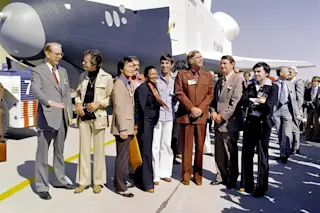Leonard Nimoy (center) with most of the Star Trek cast and NASA administrator James Fletcher (far left) at the 1976 unveiling of the Space Shuttle Enterprise. (Credit: NASA) The death of Leonard Nimoy yesterday inspired an outpouring of moving testimonials about his vast impact: as an actor, as a supporter of science and smart science fiction, as a voice of reason in media both traditional and digital. You can find these memorials all over Twitter, often accompanied by incredible photos, such as this on-set candid moment and a look at his sensitive moment as an advice columnist. Look at #LLAP (live long and prosper) and see what I mean. Even President Obama weighed in with an appreciation of Nimoy. Nimoy's indelible, decades-long performance as Mr. Spock is one of the greatest performances ever in science fiction. He was, in many ways, the central axis of Star Trek, and Trek's inspiring ...
What a Half-Vulcan Taught Us About Science
Explore how Leonard Nimoy’s Spock forged a unique balance of logic and emotion, shaping the science fiction character's legacy.
More on Discover
Stay Curious
SubscribeTo The Magazine
Save up to 40% off the cover price when you subscribe to Discover magazine.
Subscribe













